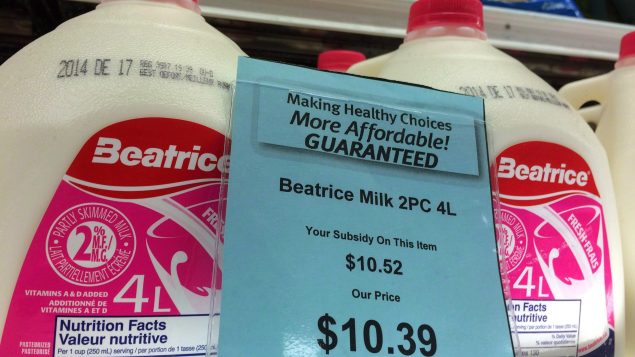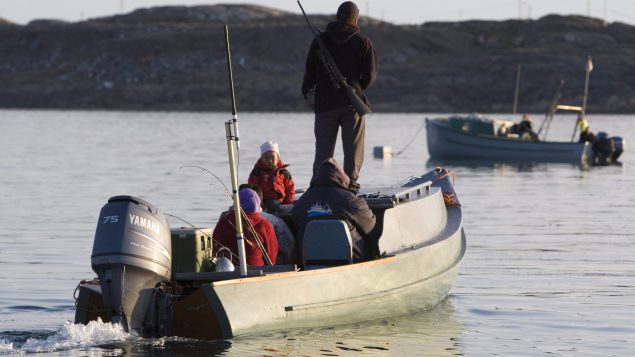Canada’s national Inuit organization says it wants to have a say in how the federal government changes a key nutritional support program designed to tackle the high cost of food for people living in isolated northern communities.
The federal government announced Monday changes to the Nutrition North Canada program to further reduce the cost of healthy foods in 117 isolated northern communities, where food prices can be up to five times higher than in southern Canada.
The changes, which will kick in as of Jan. 1 2019, include updates to the list of subsidized food and increasing subsidy rates, including a targeted subsidy towards frozen fruits and vegetables, milk, infant food and infant formula.
Ottawa proposes to invest an additional $62.6 million over five years in the program.
‘Nutrition North Canada was not working’

A price tag lists the price and subsidy of a 4-litre jug of milk at a grocery store in Iqaluit, Nunavut on December 8, 2014. (Sean Kilpatrick/THE CANADIAN PRESS)
The federal government also plans to introduce a $10.4-million Harvesters Support Grant to help lower the high costs associated with traditional hunting and harvesting activities, which are an important source of healthy, traditional food in many northern and Indigenous communities.
“Northerners and Indigenous people made it clear that Nutrition North Canada was not working, and we have listened,” said in a statement Minister of Intergovernmental and Northern Affairs and Internal Trade Dominic LeBlanc.
“The improvements we have brought to the subsidy rates, the food eligibility list, as well as the support for country food, all come from our discussions with Northerners.”
Inuit input

Inuit hunters go out in their boat as the sun prepares to set in Iqaluit, Nunavut, Friday, August 21, 2009. (Jonathan Hayward/THE CANADIAN PRESS)
Natan Obed, president of Inuit Tapiriit Kanatami, which represents about 65,000 Inuit in Canada’s north, said Ottawa needs to consult more with Inuit stakeholders, given food insecurity in Inuit communities across the vast expanse of the Canadian Arctic.
About 70 per cent of households in the Arctic territory of Nunavut are food insecure and similar challenges exist in all four Inuit populated regions, known collectively as Inuit Nunangat, Obed said.
All but one of the 51 Inuit communities are eligible for subsidies under Nutrition North Canada. About 80 per cent of the federal subsidy is directed to Inuit communities, Obed said.
“This Inuit food insecurity happens despite Nutrition North being in place, and despite Canada being one of the wealthiest countries in the world,” Obed said. “We welcome the federal government’s willingness to establish an Inuit specific food security working group.”
However, Monday’s announcement was made outside of the newly established bi-lateral Inuit Crown food security working group, Obed said.
“Our expectation going forward is that the federal government will work jointly with Inuit through the recently announced Inuit Crown bilateral process on food security to make the necessary and foundational systemic changes to NNC so it evolves into an accountable, transparent social program that reduces food insecurity in Inuit communities,” Obed said.







For reasons beyond our control, and for an undetermined period of time, our comment section is now closed. However, our social networks remain open to your contributions.